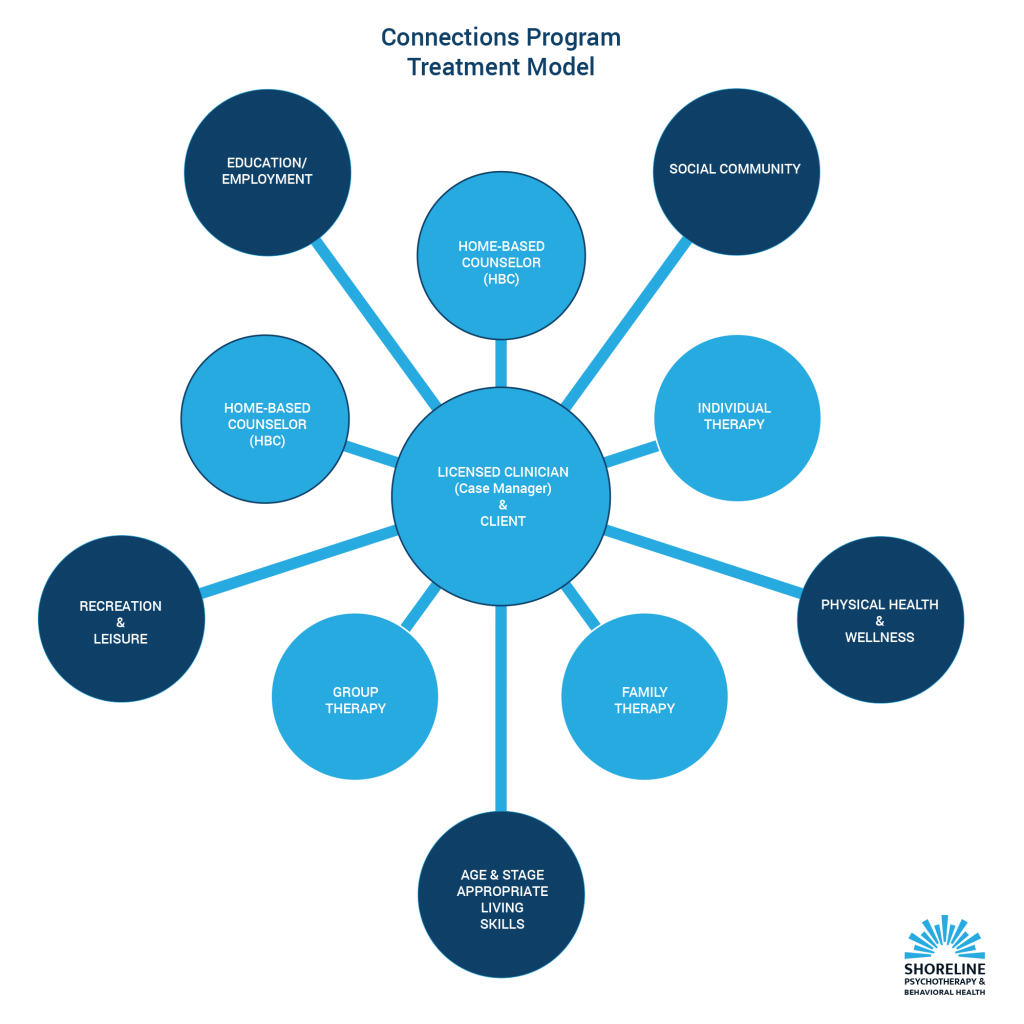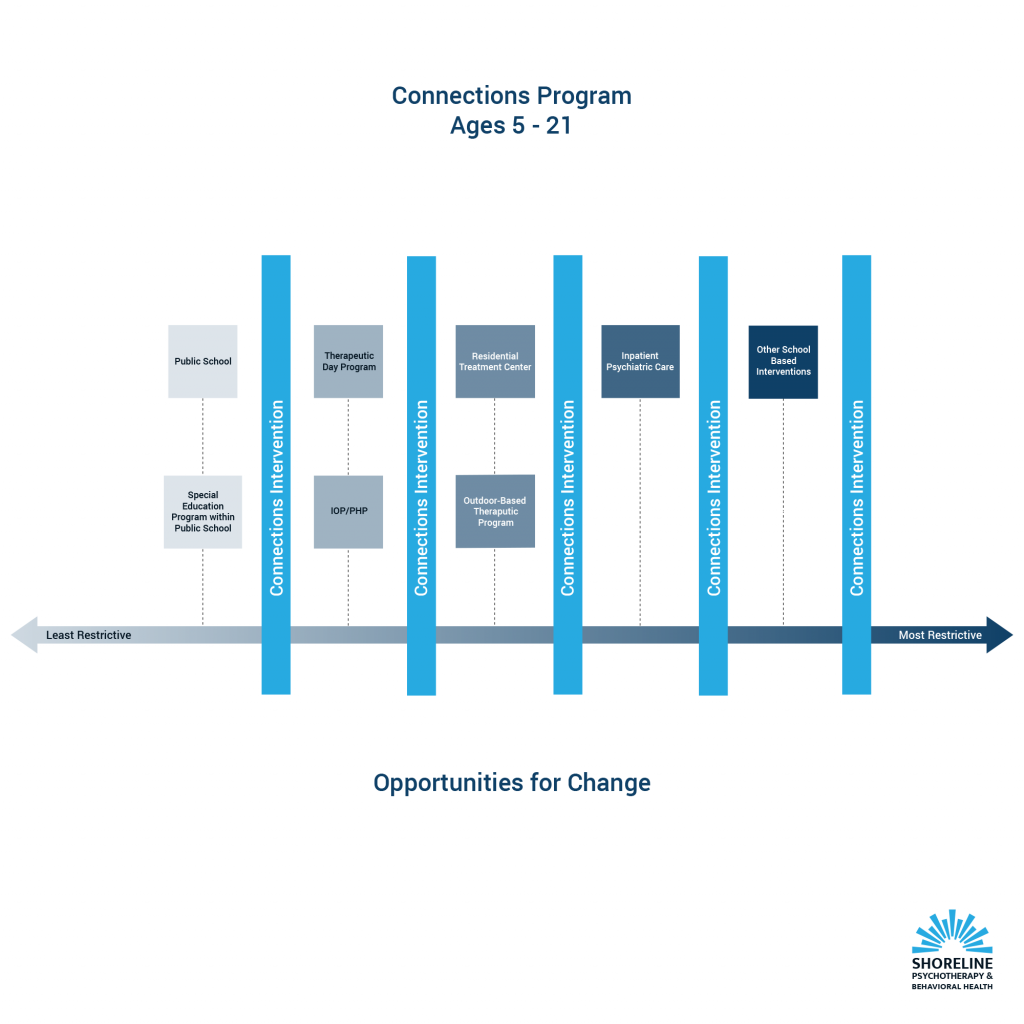COURAGE. CONNECTION. CHANGE.
Connections for Schools is a partnership program for children, adolescents, families, and school systems that provides the least restrictive environment for struggling students. This program supports a child’s individual needs while maintaining their access to education within their school district. Connections for Schools utilizes a team approach, combining case management, therapy, and in-home services to address concerns and develop healthier patterns of functioning. We aim to help students and families create a support network as they work toward self-improvement; Connections for Schools will focus on the student’s relationships within their family, school, and community to promote the enhancement of strengths and the overcoming of limitations.

Admissions Criteria
Most of our clients are eligible for special education services under the criteria for Emotional Disturbance (ED). However, other eligibility categories may include: Otherwise Health Impaired (OHI), Autism, Learning Disability (LD) among other special education identifications. Some of our students have a 504 accommodation plan; others, have not yet been classified.
Population served: students age 5-21
- School avoidance: poor attendance/truancy, struggles with morning routines, limited family support, trauma.
- Academic performance: struggles with content, work completion, grades reflecting potential; remaining in classes/on task; attention deficits.
- Behavioral issues: acting out, rule breaking, oppositional/defiant with faculty; peer relational problems—difficulty making/keeping friends, arguments/fights with others.
- Mood disturbance: social/performance-based/generalized anxiety; depression, low self-esteem; emotional regulation/frustration tolerance.
- Technology use: excessive computer/video game access—“screen time.”
- Executive Functioning: organizational challenges, time management deficits, improving multi-step procedural efficiency.
- Specific learning disorders: imperfect abilities/disruptions around spoken and written language, reading and writing, basic math calculations, perception/thinking.
Exclusions:
- Actively aggressive: violent toward self, others, or property.
- Active substance abuse/addiction: dependence on any substance. Our team will work with recreational users
- Unsafe home–determined by SPBH: presence of any violence, abuse, neglect.

Scenarios:
- Examples of services in action:
- Supporting routines: setting/responding to alarms, developing procedures/checklists/order of operations for self-care (showering, teeth brushing, laundry), organization of personal space, preparing breakfast, performing house chores, organizing backpack and school materials, preparing to meet school expectations, supporting transitions.
- School refusal: identifying causes, processing emotions; creating behavior plans to increase attendance–system of rewards and consequences; parent support–designing rules and boundaries, effective communication strategies; communication and planning with school faculty—bridging the gap between home and school.
- Academic performance: homework and study skills support—content and process on completing assignments, preparing for tests, quizzes, and projects, breaking down assignments into manageable chunks; teacher communication.
- Emotional regulation: teaching and labeling emotions, developing self-awareness and control, mindfulness, providing counseling and support, improving distress tolerance, delaying gratification.
- Technology use: appropriate online behavior—social media, communication; parameters and limits–balancing tech use with other activity; positive integration of use into daily living—calendars, alarms, applications, resources.
- Social skills and integration: reciprocity—turn taking in conversations, active listening, processing information; contextual interaction—appropriate topics, time and place; self-awareness—volume and tone of voice, facial expression and body language; taking responsibility for behavior—cause and effect.
- Services caveats, limits and boundaries:
- Parent or Guardian must be home during HBC appointments.
- SPBH does not provide transportation to school or community appointments.
- SPBH does not provide medical intervention: dispensing prescription medication, treating wounds or injuries, ambulation or hospitalization.
Goals and Outcomes
At the end of enrollment in Connections for Schools, clients will achieve emotional and functional independence including the ability to regulate feelings and behaviors, relate to and cooperate with others, and manage the responsibilities necessary to take care of themselves and lead a life that is healthy and fulfilling. These newly developed abilities will allow the client to create and sustain new points of contact as they move forward. In doing so, the client will independently access support networks as they navigate life with others and address their personal needs.
Specializing in Family Centered Therapy, Community Partnerships, and a Systems Approach in Connecticut
Call Us: 1.203.453.2999